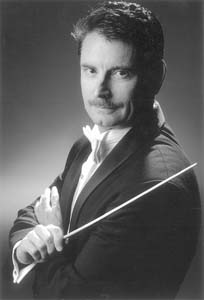![[MetroActive Music]](/music/gifs/music468.gif)
[ Music Index | Metro Santa Cruz | MetroActive Central | Archives ]
Mysterious Ways
Paul Schraub
The Santa Cruz Symphony rose to the occasion at last weekend's concert
By Scott MacClelland
YOU'LL WANT TO NOTE the day the Mystery Spot ended its centuries of Rip Van Winkle slumber, took leave of its ancient lodgings and began to wander. 'Twas last Saturday night when it crept unnoticed into the Santa Cruz Civic Auditorium and invaded the Santa Cruz Symphony, raising all manner of mysterious, enigmatic and, in the end, unanswered questions. Under John Larry Granger's baton, and notwithstanding the decades-debated enigma, the orchestra came up with one of its best readings this season--Edward Elgar's Enigma Variations--highly spirited and vividly responsive to both composer and conductor. In turn, Granger's shaping of Nimrod, the composer's heartfelt tribute to his friend and champion, August Jaeger, spilled over with affection, while the penultimate Romanza delved deep into the darkest dimensions of the composer's imagination.
In Enigma, Elgar asks for the widest range of character and effects of any work he composed. The orchestra, individually and collectively, rose to the occasion with remarkable élan and confidence, handsomely rewarding conductor Granger's many years of disciplined leadership and personal artistic growth.
The program itself sparked keen interest, juxtaposing two popular American works with the rarely heard Oboe Concerto by Richard Strauss. The Unanswered Question by Charles Ives was posed by trumpeter Warren Bartold from the top of the bleacher seats against the proscenium wall. At the same lofty heights on the opposite side of the Civic's cavern, the choir of winds tried in vain to deliver a satisfactory answer, ultimately mocking the question and then giving up. The strings, on stage and bathed in blue light, droned pianissimo static chords. The novelty of the piece, enhanced in this case by the antiphonal placement of instruments, has somehow never lost its audience appeal.
Granger then led his players through an urgent reading of Mysterious Mountain by the now 88-year-old Alan Hovhaness. The work remains the composer's masterpiece, featuring the strongest and best sustained use of modal harmonies, restless incantations and haunting themes among his hundreds of compositions. Further, its capstone, a centrally positioned, high-speed double fugue, deploys breathtaking antiphonal craftsmanship.
The orchestra conveyed the spirit and impact of the inspired score, then turned on a dime to the Strauss piece, a work of totally different style and no small technical challenge. The piece was suggested to the elderly composer by John DeLancie, then a liberation soldier in Germany, later principal oboe of the Philadelphia Orchestra (who gave the pre-concert audience his recollections of the encounter). Soloist Kathryn Greenbank (a DeLancie pupil) delivered a splendid performance, full of character and astonishing virtuosity. Notwithstanding the difficulty of the solo part, the work itself is good for laughs, requiring of the thin-toned soprano instrument heroic posturing typically associated with the horn, those machismo flourishes of Don Juan and Ein Heldenleben. Greenbank, in fact, conveyed a rich sound and proved the oboe can be heroic when the opportunity calls.
Copyright © Metro Publishing Inc. Maintained by Boulevards New Media.
![]()
 Proper Conduct: Conductor John Larry Granger illustrated his artistic growth at last Saturday's inspired concert by the Santa Cruz Symphony.
Proper Conduct: Conductor John Larry Granger illustrated his artistic growth at last Saturday's inspired concert by the Santa Cruz Symphony.
From the March 31-April 7, 1999 issue of Metro Santa Cruz.